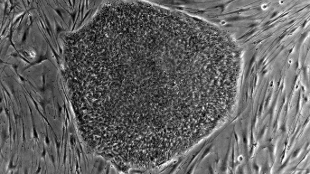 Human embryonic stem cell colony WIKIMEDIA, ID711Hwang Woo-Suk, a stem cell scientist who had two Science papers retracted in the mid-2000s, has continued his research on animal cloning at Sooam Biotech Research Foundation in South Korea. Earlier this month, the US Patent and Trademark Office (USPTO) approved a patent for the very same human embryonic stem cell line that was the subject of the fraudulent work. But the victory was short lived. Today (February 28), South Korea’s Supreme Court confirmed that Hwang is guilty of embezzlement and bioethics violations, although the court did uphold the acquittal of fraud charges. It bounced the researcher’s plea to overturn his dismissal from Seoul National University (SNU) back to a lower court for further review.
Human embryonic stem cell colony WIKIMEDIA, ID711Hwang Woo-Suk, a stem cell scientist who had two Science papers retracted in the mid-2000s, has continued his research on animal cloning at Sooam Biotech Research Foundation in South Korea. Earlier this month, the US Patent and Trademark Office (USPTO) approved a patent for the very same human embryonic stem cell line that was the subject of the fraudulent work. But the victory was short lived. Today (February 28), South Korea’s Supreme Court confirmed that Hwang is guilty of embezzlement and bioethics violations, although the court did uphold the acquittal of fraud charges. It bounced the researcher’s plea to overturn his dismissal from Seoul National University (SNU) back to a lower court for further review.
SNU first launched an investigation back in 2005, after questions emerged surrounding Hwang’s reports that his team had created the first stem cell line derived from a cloned human embryo as well as several patient-specific stem cell lines. The university’s investigating panel concluded that that the data and images in both Science paper had been fabricated. Hwang subsequently admitted to this misconduct, blaming more junior researchers, according to ScienceInsider. Science retracted both papers, and Hwang was dismissed from SNU in March 2006.
Hwang’s legal battle has continued ever since. He was convicted of embezzling research funds and of illegally buying human eggs for his research by a trial court in October 2009, but was acquitted of fraud charges. An appeals court upheld the verdict, but ...



















